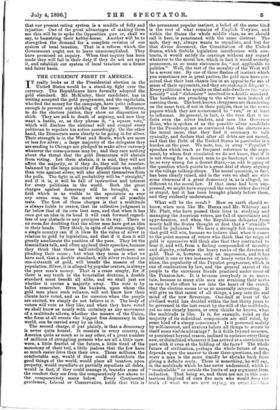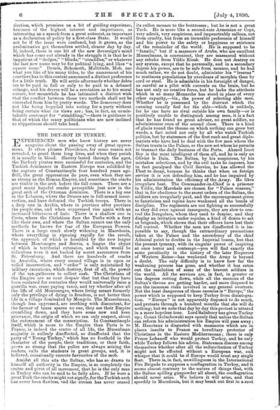THE CURRENCY FIGHT IN AMERICA.
IT really looks as if the Presidential election in the United States would be a stand-up fight over the currency. The Republicans have formally adopted the gold standard. Mr. McKinley, their candidate, has in writing accepted the gold programme, and the capitalists, who find the money for the campaign, have quite influence enough to prevent any shirking of the issue. Moreover, to do the electors justice, they show no disposition to shirk. They are sick to death of arguing, and now they want a battle, or, as they phrase it, "a square vote," which will disclose the national will and compel every politician to regulate his action accordingly. On the other hand, the Democrats seem clearly to be going in for silver. Their strength is in the West and South, which are more or less for silver ; a large majority of the delegates they are sending to Chicago are pledged to make silver currency whatever the consequences may be ; and they care nothing about the threat that the gold Democrats will abstain from voting. Let them abstain, it is said, they will not affect the majority, or if they do, they will be counter- balanced by the large minority of Republicans who, rather than vote against silver, will also absent themselves from the polls. The fight in all probability will be "straight," and if it is, it will be full of instruction and interest for every politician in the world. Both the great charges against democracy will be brought, on a field which is as visible to the spectators as ever any arena was, to the most severe of all possible tests. The first of those charges is that a multitude is always liable to crazes, that its collective judgment is far below that of its own best men, and that when it has once got an idea in its head it will rush forward regard- less of any obstacle or any precipice in its way. There is no room for doubting that the silver men have got an idea in their heads. They think, in spite of all reasoning, that a single country can if it likes fix the value of silver in relation to gold by legislation, and that if it does it will greatly ameliorate the position of the poor. They let the bimetallists talk, and often applaud their speeches, because they think that those half-intelligible gentlemen are pleading their cause ; but what they mean is what we have said, that a double standard, with silver reckoned as one-sixteenth of gold, will benefit the masses of the population. Silver, it is alleged by popular orators, is always the poor man's money. That is a craze simply, for if there is any truth in the bimetallist doctrine, a double standard must benefit all alike, and we shall just see whether it carries a majority away. The vote is by ballot remember. Even the bankers, upon whom the gold men place such reliance, will not know how their clients have voted, and as for coercion when the people are excited, we simply do not believe in it. The body of voters will vote as they like, and when they have voted we shall know as nearly with certainty as any movement of a multitude allows, whether the masses of the Union, who form at all events the biggest free democracy in the world, can be carried away by an idea. The second charge, if put plainly, is that a democracy is never quite honest. It consists in every country, in America quite as much as in any other, of a great number of millions of struggling persons who are all a little care- worn, a little fearful of the future, a little tired of the monotony of their toil, a little jealous that the few have so much easier lives than their own. Those millions, the comfortable say, would if they could redistribute the good things of the world, would place all taxation upon property, would repudiate or partially repudiate all debts, would in fact, if they could manage it, transfer some of the comfort they see from the comparatively few above to the comparatively many below. Every Continental gentleman, Liberal or Conservative, holds that this is the permanent popular instinct, a belief of the same kind is the root of what remains of English Toryism, and within the States the whole middle class, as we should call it here, is penetrated with the same distrust. The. mob, they say, always wants to repudiate, and but for that divine document, the Constitution of the United States, which forbids legislative interference with con- tracts, it would satisfy its cravings without any regard whatever to the moral law, which in fact it would secretly pronounce, as so many statesmen do, "not applicable to politics." Well, the test of the morality of the West will be a severe one. By one of those flashes of instinct which you sometimes see in great parties, the gold men have per- ceived that their best chance lies in an appeal to the mo .at sense of their opponents, and they are making it diligEnt'5. Every,politician who speaks on that side dwells on the "dig- honesty" and " dishonour " involved in a double standard. The bankers are preaching to the silver men instead of coercing them. The best-known clergymen are thundering on the same text, if not in their pulpits, then in the news- papers which they are accustomed to "run," or at least to influence. So general, in fact, is the tone that it in- fects even the silver leaders, and men like Governor Boies, who is spoken of as the possible silver candidate for the Presidency, are so convinced that the electors see the moral issue, that they find it necessary to talk cynically, and declare that after all debts are not sacred, and that the Debt of the United States in particular is a burden on the poor. We note, too, in stray " Populist " speeches which reach us frequent reference to the argu- ment, by whom first circulated we do not know, that if it is not wrong for a decent man to go bankrupt it cannot be.so very wrong for a decent State,—an odd begging of the question which points to a great deal of sharp arguing- in the village talking-shops. The moral question, in fact, has been clearly raised, and in the vote we shall see with some clearness if a great democracy is, as is alleged, in- different to the moral law. If that issue had been sup- pressed, we might have supposed the voters either deceived, or stupid, but it has been brought plainly before them,, and they evidently understand.
What will be the result ? How on earth should we know, when men like Mr. Hanna and Mr. Whitney and Mr. Platt, who have passed their lives in studying and managing the American voters, are full of uncertainty and apprehension, and when the Republican delegates from, nearly half the States thought at first that a " straddle " would be judicious ? We have a strongly felt impression that gold will win, because we believe that when it comes to the point masses of voters who think that the reign of gold is oppressive will think also that they contracted to bear it, and will, from a feeling compounded of morality and dignity, reinforce the heavy ranks of the devotees of gold. That is, however, only an impression, and it has against it one or two instances of heavy votes for repudi- ation, the popularity of the Populist programme, which is. one of confiscation by law, and the general assent of the people to the enormous frauds practised under cover of the Pension-law. It is because everybody is so uncer- tain, because so many able men are straining their necks in vain in the effort to see into the heart of the crowd,. that the election seems to us so unusually interesting. It will give us that rarest of all things, a peep into the real mind of the new Sovereign. One-half at least of the civilised world has decided within the last thirty years to be governed in the last resort by the will of the multitude, yet no one clearly knows, or even thinks he knows, what the multitude is like. Is it, for example, ruled as the majority of its individual components are still ruled, by some kind of a sleepy conscience Is it governed mainly by self-interest, and anxious before all things to secure to itself some visible advantage ? Is it fickle beyond measure, or persistent beyond reason, inclined to embrace everything new, or disinclined whenever it has arrived at a conviction to- part with it even at the bidding of the facts P The whole future of civilisation, perhaps the whole future of man, depends upon the answer to those three questions, and the wiser a man is the more timidly he shrinks back from giving a definite reply. There is something, he will say, in the multitude which he has never understood, which is " incalculable " or outside the limits of any argument from induction. That being so, and there are not in thie con- tentious England of ours five men who would deny tbn truth cf what we are now saying, an event Ik th:a election, which promises us a bit of guiding experience, becomes of the highest interest and importance, as interesting as a speech from a great autocrat, as important as a declaration of policy by a first-class State. It would not be if the issue were confused, but it grows, as the preliminaries get themselves settled, clearer day by day. If, indeed, there is one bit of the new Sovereign's mind which has come out already in the struggle it is that he is impatient of "dodges," "blinds," "straddles," or whatever the last new name may be for political lying, and likes "a square issue." Demos, Behemoth, Multitude, Mob, use what you like of his many titles, to the amazement of his courtiers has in this contest announced a distinct preference for a little truth. He will settle afterwards whether debts are to be paid in full or only to be paid in a debased coinage, and his decree will be a revelation as to his moral nature, but meanwhile he has intimated a distinct wish that the conflict between those two methods shall not be concealed from him by pretty words. The democracy does not like being beguiled into voting for a party without being certain what its views are ; has, in fact, an unmis- takable contempt for "straddling,"—there is guidance in that of which the many politicians who are now inclined to slipperiness should take heed.











































 Previous page
Previous page